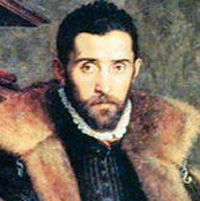Critical Note on Discourses on the Heroic Poem (Excerpts)
Poetry has mainly four species: epic, tragedy, comedy, and songs. Poetry is imitation, yet it is different from other sorts of imitative art. Poetry imitates human and divine actions. It is corollary to say that those who do not sing human or divine actions cannot be poets. Therefore, Homer cannot be a poet when he sketched the war between the frogs and the mice nor Virgil of bees.

Torquoto Tasso (1544-1595)
Only those can be called poets who describe "divine and human actions . . . and not the actions of the elements and other natural force"(176). Poetry has a moral purpose to serve. It helps "men by the example of human deeds." The illustration of animal's deeds cannot be useful and the divine actions are not suitable to human beings, so, poetry should imitate human actions and guide us to live moral life.
The aim of poetry is as Horace says cannot have two, one independence of the other. The excellent purpose is enjoyment coupled with virtue. The poet should not imitate base and dishonest deeds. The good poet seeks advantage that is good than useful. The purpose of enjoyment is not to be away from virtue rather the aim at pleasure is nobler than to aim at profit because virtue exalts human nature. It is virtuous delights rather vicious ones that poetry favours.
The poet considers an idea of beauty. In this sense, he is philosopher. Therefore, Tyre says "the philosophy and poetry are two in one name but of a single substance. . . ." (179).
Poetry seeks and longs for beauty and strives to reveal it in twofold: one narration, the other representation. The epic poetry is narrative; the tragedy is dramatic (representative). The epic is "an imitation of a noble action, great and perfect, narrated in the loftiness verse, with the aim of giving profit through delight" (179).
Tragedy advantages by delighting and so does the comedy. The purpose of tragedy is to cleanse the heart by terror and compassion, whereas comedy aims at moving laughter at base things when one laughs at the baseness seen in others, he/she grows ashamed to commit similar baseness. That is the brilliant effect of the comedy. The epic poem produces its effects moving in wonder. In the epic poem, gods and angles frequently descend from heaven and involve themselves in mundane affairs with their counsel and assistance as Apollo and Minerva do in Homer's Iliad and Odyssey.
The epic poem is a whole and has its components: qualitative and quantitative. The former is further divided into four: fable, the moral habit of the persons introduced in the fable, thought and diction. The quantitative part can be further divided into another four. In the first part is prologue in which the poet "proposes, narrates, declares the present state of things, and supplies information about the past . . . ." (181); in the second part, things get disturbed; in the third they begin to unravel; in the fourth, they reach to their conclusion. These parts can be stated respectively as introduction, perturbation, reversal and conclusion. Introductory part informs about characters and events in general, recognition is a passage from ignorance to knowledge of a person once learnt and later fallen into sheer oblivion. Then follows the pathos of death and wounds and lamentations and complaints. The reversal part is a change from good to bad fortune or from bad to good. The epic exposes double changes, because "some character pass from prosperity to adversity and others the reverse." (181). The ending of the epic is happier one.
